| Listing 1 - 10 of 93 | << page >> |
Sort by
|
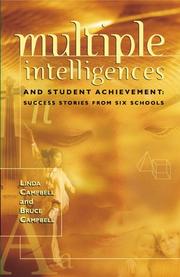
ISBN: 1280928727 9786610928729 1416604391 0871205416 9780871205414 9780871203601 087120360X 9781416604396 9781280928727 9781416604389 Year: 1999 Publisher: Alexandria, Va. Association for Supervision and Curriculum Development
Abstract | Keywords | Export | Availability | Bookmark
 Loading...
Loading...Choose an application
- Reference Manager
- EndNote
- RefWorks (Direct export to RefWorks)
Finally, a book about multiple intelligences (MI) theory that answers the questions that all educational innovations must ultimately address: ''What are the results on student achievement?'' ''How were those results achieved?'' Multiple Intelligences and Student Achievement describes six schools that have used MI theory for five or more years. Through case studies of two elementary, two middle-level, and two high schools, Linda and Bruce Campbell illustrate why markedly different schoolsùlarge and small, rich and poor, inner-city and suburbanùlooked to MI when they wanted to boost student lear
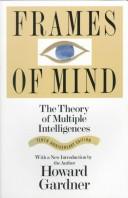
ISBN: 0465025080 Year: 1983 Publisher: New York Basic Books
Abstract | Keywords | Export | Availability | Bookmark
 Loading...
Loading...Choose an application
- Reference Manager
- EndNote
- RefWorks (Direct export to RefWorks)
Book
ISBN: 1280435402 9786610435401 0749447311 1597343889 Year: 2004 Publisher: London ; Sterling, VA : Kogan Page,
Abstract | Keywords | Export | Availability | Bookmark
 Loading...
Loading...Choose an application
- Reference Manager
- EndNote
- RefWorks (Direct export to RefWorks)
Writing in a personal and engaging style, Cook, a leadership development consultant, shows readers how to lead and navigate change by employing business, political, spiritual, and emotional intelligences. Numerous activities and checklists will help readers gain insight on everything from supplier analysis and negotiation skills to defining a perso
Book
ISBN: 2725627877 9782725627878 Year: 2008 Publisher: Paris: Retz,
Abstract | Keywords | Export | Availability | Bookmark
 Loading...
Loading...Choose an application
- Reference Manager
- EndNote
- RefWorks (Direct export to RefWorks)
Selon l'approche classique, l'intelligence serait une faculté unique et générale, mesurable par le fameux QI, grâce à des tests. De là à penser que le classement des individus sur " l'échelle de l'intelligence " refléterait la hiérarchie des destins scolaires, professionnels et sociaux, le pas est vite franchi. Or, évaluer chaque individu isolément sur quelques compétences hors contexte n'est plus crédible au regard de la science comme des besoins de la société. Le grand mérite de Howard Gardner, il y a vingt ans, est d'avoir formulé la théorie des intelligences multiples. Il n'y a pas une forme unique d'intelligence mais plusieurs formes indépendantes dont nous sommes tous dotés dans des proportions extrêmement variables. Il s'agit de l'intelligence langagière, logico-mathématique, spatiale, musicale, kinesthésique, interpersonnelle, intrapersonnelle. Aux sept intelligences repérées initialement, le psychologue en ajoute une huitième : l'intelligence naturaliste. Il s'interroge aussi sur l'existence d'une intelligence spirituelle, existentielle ou morale, comme aptitude à se situer par rapport aux limites cosmiques (l'infiniment grand et l'infiniment petit) ou à édicter des règles ou des comportements en rapport au domaine sacré de la vie. Écrit dans un style d'une grande clarté, cet ouvrage s'adresse à tous ceux qui désirent prendre connaissance d'une ample vision de l'intelligence humaine.
Multiple intelligences --- Learning --- Intellect --- Education
Book
ISBN: 9781475834611 9781475834604 1475834608 1475834616 Year: 2019 Publisher: Lanham, Maryland: Rowman & Littlefield,
Abstract | Keywords | Export | Availability | Bookmark
 Loading...
Loading...Choose an application
- Reference Manager
- EndNote
- RefWorks (Direct export to RefWorks)
Are schools smart enough to detect the cognitive diversity of students? In this book we will discuss a framework that will help teachers identify the talents of their students."--Publisher's description
Cognitive learning theory --- Cognitive neuroscience --- Multiple intelligences
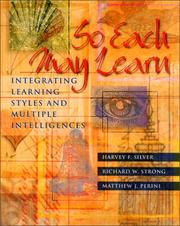
ISBN: 0871203871 9780871203878 Year: 2000 Publisher: Alexandria Association for supervision and curriculum development
Abstract | Keywords | Export | Availability | Bookmark
 Loading...
Loading...Choose an application
- Reference Manager
- EndNote
- RefWorks (Direct export to RefWorks)
Cognitive styles --- Learning, Psychology of --- Multiple intelligences
Book
ISBN: 9781416607892 Year: 2009 Publisher: Alexandria ASCD
Abstract | Keywords | Export | Availability | Bookmark
 Loading...
Loading...Choose an application
- Reference Manager
- EndNote
- RefWorks (Direct export to RefWorks)
Cognitive styles --- Learning --- Multiple intelligences --- Teaching
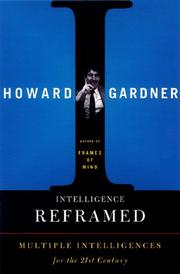
ISBN: 0465026117 9780465026111 0465026109 9780465026104 Year: 1999 Publisher: New York : Basic Books,
Abstract | Keywords | Export | Availability | Bookmark
 Loading...
Loading...Choose an application
- Reference Manager
- EndNote
- RefWorks (Direct export to RefWorks)
From the Publisher: A brilliant state-of-the-art report on how the landmark theory of multiple intelligences is radically changing our understanding of education and human development. Since its original description in Frames of Mind (1983, 1993), the theory of multiple intelligences has taken its place as one of the seminal ideas of the twentieth century. Further explicated in Gardner's 1993 book, Multiple Intelligences, these ideas continue to attract attention and generate controversy all over the world. Now, in Intelligence Reframed, Gardner provides a much-needed state of the art report on the theory. He describes how it has evolved and been revised. He introduces two new intelligences, and argues that the concept of intelligence should be broadened, but not so much that it includes every human faculty and value. In addition, he offers practical guidance on the educational uses of the theory, and responds in lively dialogue to the critiques leveled against it. Harvard psychologist Howard Gardner has been acclaimed as the most influential educational theorist since John Dewey. His ideas about intelligence and creativity-explicated in such bestselling books as Frames of Mind and Multiple Intelligences (over 200,000 copies in print combined)-have revolutionized our thinking. In his groundbreaking 1983 book Frames of Mind, Howard Gardner first introduced the theory of multiple intelligences, which posits that intelligence is more than a single property of the human mind. That theory has become widely accepted as one of the seminal ideas of the twentieth century and continues to attract attention all over the world. Now in Intelligence Reframed, Gardner provides a much-needed report on the theory, its evolution and revisions. He offers practical guidance on the educational uses of the theory and responds to the critiques leveled against him. He also introduces two new intelligences (existential intelligence and naturalist intelligence) and argues that the concept of intelligence should be broadened, but not so absurdly that it includes every human virtue and value. Ultimately, argues Gardner, possessing a basic set of seven or eight intelligences is not only a unique trademark of the human species, but also perhaps even a working definition of the species. Gardner also offers provocative ideas about creativity, leadership, and moral excellence, and speculates about the relationship between multiple intelligences and the world of work in the future.
Multiple intelligences --- Intellect. --- Creativiteit. --- Créativité. --- Education. --- Intelligence. --- Intelligences multiples. --- Intelligentie. --- Intelligenz. --- Multiple intelligences. --- Psychologie. --- Quotient intellectuel.
Periodical
Abstract | Keywords | Export | Availability | Bookmark
 Loading...
Loading...Choose an application
- Reference Manager
- EndNote
- RefWorks (Direct export to RefWorks)
early childhood education --- instructional media --- psychology --- games --- playing --- multiple intelligences
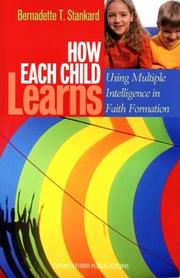
ISBN: 9781585952694 1585952699 Year: 2003 Publisher: Mystic: Twenty-Third Publications,
Abstract | Keywords | Export | Availability | Bookmark
 Loading...
Loading...Choose an application
- Reference Manager
- EndNote
- RefWorks (Direct export to RefWorks)
Christian education of children --- Multiple intelligences --- Learning strategies
| Listing 1 - 10 of 93 | << page >> |
Sort by
|

 Search
Search Feedback
Feedback About UniCat
About UniCat  Help
Help News
News